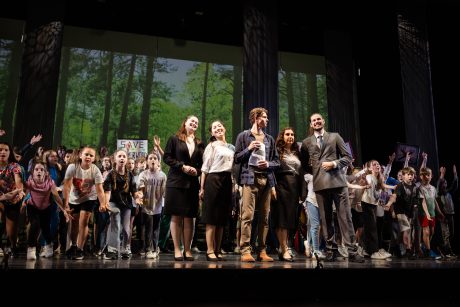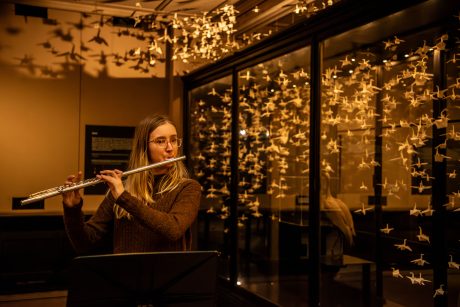From solar storage to symphonies, going green can be good for business and for culture
9th January 2025
 The RNCM’s year-long campaign, ‘The Future is Green’, demonstrates how music organisations can take a holistic approach to environmental sustainability. Manus Carey, the RNCM’s Deputy Principal (Performance and Programmes), told us more about how the conservatoire is taking practical steps towards net zero, as well as making space for creative responses to the climate crisis.
The RNCM’s year-long campaign, ‘The Future is Green’, demonstrates how music organisations can take a holistic approach to environmental sustainability. Manus Carey, the RNCM’s Deputy Principal (Performance and Programmes), told us more about how the conservatoire is taking practical steps towards net zero, as well as making space for creative responses to the climate crisis.
As music educators, we couldn’t be better placed to drive the conversation – and our students and audiences expect us to do that.

©Robin Clewley
The urgent agenda of climate change is one that has influenced our decisions as an institution for some time. It’s 14 years since we put our Carbon Management Plan in place; in that time, we became the only Higher Education Institution (HEI) in Greater Manchester to receive funding as part of the Public Sector Decarbonisation Scheme, we removed all investments in fossil fuels, and we began making significant (and still ongoing) changes to our building to meet our 2038 full heat decarbonisation target – part of our wider commitment to Greater Manchester’s net zero carbon pledge.
In 2023-2024, we put the climate emergency at the heart of our public performance programme too, with our The Future Is Green campaign. The principal aim was to stimulate an ambitious institutional response to the subject in relation to music, as well as reflect the voice of the next generation concerned about their future and the future of the music industry. There’s compelling evidence that cultural audiences want us to drive that conversation; many are already very concerned about climate change and are making meaningful changes to their own lifestyles. The most recent Act Green survey found that 72 percent of audiences believe cultural organisations have a responsibility to influence society on this topic, and more than half expect a conversation to be prompted through programming.
 We assessed our own response holistically, inviting academic, research, performance, operations, catering, development, and marketing staff, and the Students’ Union to contribute their perspectives, and we asked them, ‘What role could, and should, musicians have in relation to climate change and the environment?’. Their response beautifully captured the creative and truly collaborative approach that underpins what we at the RNCM are all about; each project appealed to the imagination and the emotions to deliver a stark but ultimately positive and hopeful message about our impact on the planet – utilising very diverse music to convey a complex but universal narrative that had a visible impact on performers and audiences.
We assessed our own response holistically, inviting academic, research, performance, operations, catering, development, and marketing staff, and the Students’ Union to contribute their perspectives, and we asked them, ‘What role could, and should, musicians have in relation to climate change and the environment?’. Their response beautifully captured the creative and truly collaborative approach that underpins what we at the RNCM are all about; each project appealed to the imagination and the emotions to deliver a stark but ultimately positive and hopeful message about our impact on the planet – utilising very diverse music to convey a complex but universal narrative that had a visible impact on performers and audiences.
These performances, across the year, reflected every aspect of our creative approach: collaboration between professional, student, amateur, and young people, as well as across genres; reimagining and recontextualising music from the past and blending the old and the new; shaping the future of music through new ways of engaging and new skills of blending notated and improvised music; and responding to issues in society that our student musicians care deeply about.

©Robin Clewley
Three standout shows at the close of our season illustrated those ambitious aims. A leading percussionist and RNCM graduate, Radio 3’s Delia Stevens returned to work with our students alongside award-winning folk musician Will Pound, the Royal Liverpool Philharmonic Orchestra, and climate activists Force of Nature on The Silent Planet – which reimagined Holst’s The Planets in its 150th anniversary year and contributed a dramatic new movement, Earth. We also commissioned communities in Greater Manchester to create a brand-new opera from scratch called Silverwood, which inspirational composer/conductor Kate Pearson brought to stage with our RNCM Community Chorus, RNCM student musicians, and young people from the area. And we closed the season with Nature’s Music, which featured a full programme of performance and song inspired by the environment and presented live by 90 of our students at Manchester Museum.

©Charlotte Wellings
Throughout the year, we encouraged students to think creatively about how they could bring the topic into our Lunchtimes and Spotlights concerts, to be experimental with it and immerse audiences in the debate, and to pitch original ideas for sustainable projects that we could support through our Green Fund and Principal’s Circle. We were shortlisted for Outstanding Contribution to Environmental Leadership in the 2023 Times Higher Education Awards, and now a year of performance and research has resulted in an excellent set of resources for the whole sector and beyond, which is freely available through our website.
Before the launch of The Future is Green, our Head of Enterprise (Academic), Michelle Phillips, conducted a survey with all RNCM staff on attitudes and behaviours around climate change, and then repeated it after our year of activity – the first longitudinal exploration of whether sustained arts engagement can have an impact on those values. It’s further evidence of how seriously we’re taking this subject, and we expect to be able to report the results at the end of the summer. Michelle is also currently working with three other HEIs on a grant that will fund 30 PhD places focused on climate change and resilience in young people.
For us, the experience has been enlightening, opening up ideas institutionally and creatively, and offering insights into how we take audiences with us on that journey. Understanding that will be critical for us in the future, as we join organisations in Greater Manchester and around the world in declaring a climate emergency, and retain focus on our environmental obligations.
Written by Manus Carey, Deputy Principal (Performance and Programmes)
Don’t forget to visit the This Is Not A Rehearsal webpage to explore more news, training & events, resources and research to support you on your sustainability journey. If you’d like to stay up to date with training and resources related to the climate crisis within the music education sector, click here to sign up for our ‘This Is Not A Rehearsal’ monthly newsletter.



